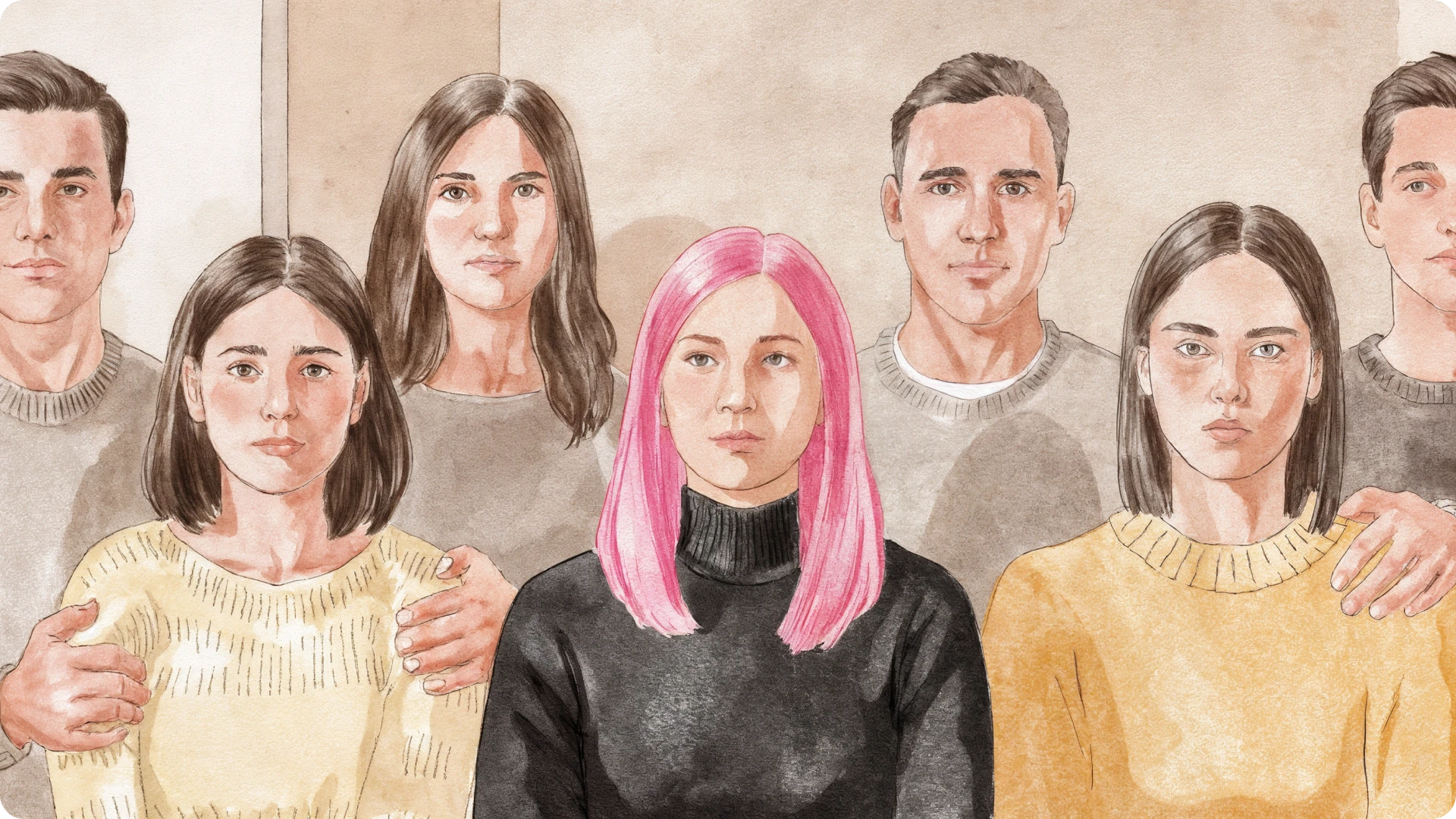Do you feel “different” in your own family? Does any communication with relatives end in criticism and emotional pain? Those experiences might make you feel isolated and lost, and wonder whether you’re the black sheep of the family.
So, what does it really mean to be the black sheep, and how to break free? Start with the childhood trauma test to get insights into how early familial rejection may affect your mental health.
What Is the Black Sheep of the Family?
The “black sheep” idiom refers to rare black sheep in white flocks whose black wool was less valuable for dyeing, making them less wanted by farmers. But what does it mean to be the black sheep of the family? While it’s not a clinical diagnosis, the “black sheep” term describes someone who stands out from their family members, typically due to their beliefs, behaviors, or life choices.
For example, you are part of a family of lawyers. Everyone breathes law, conversations revolve around cases, and your dream of becoming an archaeologist. Dismissive comments about “non-lucrative” work and its disconnect from “real life” might leave you feeling misunderstood and thinking you don’t belong here. Such dysfunctional family roles and toxic family dynamics can negatively impact your overall well-being, contributing to feelings of loneliness, anxiety, isolation, or depression, according to a study on the “black sheep” phenomenon [1].
Wondering what career is right for you? The Breeze app offers self-discovery tests about your emotional intelligence, personality, career, goals, values, and relationship patterns.

6 Signs You’re the Black Sheep of the Family
If you wonder, “Am I the black sheep of the family?”, here are the most common signs:
1. You feel like you don’t belong
This is perhaps the most common sign of being the black sheep. You may feel like your family doesn’t care about you or that you don’t share the same values or interests as your family members.
For example, during family dinners, you might feel like an observer rather than a participant or struggle to find things to talk about with your relatives. Your ideas or dreams might be met with hurtful jokes and careless comments, which might make you feel you don’t belong in this family. You may also feel like you’re constantly being judged or criticized, which can make you think, “Why do I feel guilty all the time?”
2. You have different values or beliefs
This could be anything from religion and politics to career choices and lifestyle preferences. If your family is very traditional and you’re a free spirit, or if they’re all doctors and you’re a musician, you’re likely to feel like a bit of an outsider.
For example, your family is very religious, and you aren’t. Family gatherings often involve discussions about faith, which make you feel uncomfortable and misunderstood. Or, maybe you want to explore the world and live an adventurous life, but your family is more concerned about getting married and starting a family. It can make you feel worthless around other members of your family. You may even catch yourself thinking, “Maybe I should just do what they expect,” even though it doesn’t feel right.
3. You don’t feel seen or valued by your family
You might feel like the black sheep of your family if your relatives don’t take you seriously, constantly joke at your expense, exclude you from family photos, or forget about you when planning trips. This could also be the reason you experience birthday depression if your family forgets or neglects to celebrate it.
4. You’re constantly compared to other siblings
Such comparison may happen among children of narcissistic parents, making you feel competitive every day. If your emotionally immature parents constantly talk about what your siblings have achieved, you may feel even more like a lone wolf, asking yourself, “Why am I such a failure?”
Did your parents compare you to your siblings?
5. You feel a sense of relief when you’re not around your family
Interactions in dysfunctional families can be filled with arguments or criticism for not fitting the mold. Distance allows a break from that negativity and emotionally exhausting conversations. That’s why, for example, after a tense family dinner, you feel a relief returning to your apartment.
Curious how your emotional patterns affect your reactions to family stress? Take the Emotional Intelligence Test to understand your triggers and emotional responses to protect your well-being.
6. You’re looking for support outside the family
Since your biological family doesn’t always understand or support you, you may turn to friends, mentors, or chosen family for comfort and advice. For example, you might share your career dreams with a friend who listens and encourages you, or ask a mentor for guidance on a big life decision. These supportive people help you feel valued, understood, and more confident in your choices.
Black Sheep Syndrome: Family Dynamics and Scapegoating
One of the children of narcissistic parents can become the scapegoat for the family’s problems. A scapegoat child is often blamed for conflicts, mistakes, or tensions that aren’t really their fault. When one child becomes a scapegoat, it helps others avoid taking responsibility for their own inadequacies, mistakes or emotions.
This often happens when the child is more honest, sensitive, or different from the rest of the family. Their independence or strong opinions may feel like a threat to the family’s comfort zone. For example, a scapegoat can openly express anger and be called “difficult,” but others are perceived as “calm” no matter how they feel.
The family usually treats a scapegoat as the “problem,” even when they’ve done nothing wrong. As a result, such a child may feel chronic guilt, fall into a shame spiral, wonder “Why am I so emotional?” and have difficulties setting healthy boundaries or asserting themselves, according to research on scapegoating [2].
Take our well-being test to get a complete picture of your emotional and mental wellness.
Why Am I the Black Sheep?
People become black sheep of the family for various reasons and at different ages. They can become black sheep from birth because they were unwanted, unloved, and perceived by their parents only as a consumer of their financial and emotional resources.
Alternatively, they can become black sheep in adolescence, according to research on adolescents’ affective and neural responses to parental praise and criticism [3]. Among possible reasons are that they have made important life decisions and chosen a path unacceptable to their relatives or abandoned the religion that all family members follow.
Another reason for becoming a black sheep is resistance to an unhealthy family system. For example, you’re the first in your family to go to psychotherapy. Or, you’re the first to leave your hometown to improve your quality of life, pursue education, or be with a partner your family doesn’t fully accept. In this case, a person appears to be a problem for everyone, inconvenient and difficult to understand. But in reality, they are reacting normally to an inappropriate situation, such as violence, abuse, neglect, or manipulation.
Finally, favoritism also often drives a lot of the tension in dysfunctional families, according to research on scapegoating and favoritism [6]. One child, often called the golden child, is praised and idealized for meeting the parents’ expectations. On the other hand, the “black sheep” child gets blamed for problems, criticized for being independent, or punished for questioning the rules. This contrast creates hierarchy when the golden child represents success and approval, and the black sheep is the family’s emotional burden.

Effects of Being a Black Sheep
Here are some of the effects of being the black sheep in family life:
- Difficulties coping with emotional baggage or a mental health condition. Loneliness, feeling abandoned, sadness, and anger are all common. In some cases, being the black sheep may lead to anxiety and depression, according to research on the communicative process of resilience for marginalized family members [4].
- Low self-esteem. Constant criticism or judgment from family might affect your sense of self-worth. You might start to question your own choices and decisions, wondering, “Why is everyone so mean to me?” This can also be common for daughters of narcissistic mothers, according to research on the impact of parental narcissistic personality disorder on children [5]. The reason is that they didn’t experience unconditional love from their parents, and this can shape a lasting belief that love must be earned through perfection or people-pleasing.
- Fear of intimacy. If you struggle with feelings of rejection and loneliness or were treated differently from your siblings, building healthy relationships outside the family can be difficult. You might have a hard time trusting people or letting them get close.
- Attachment trauma. This can show up as a strong sense of being misunderstood by your family, which may contribute to attachment trauma as well. This often shows up as difficulty forming secure relationships, fear of abandonment, or hypervigilance.
How to Cope When You Feel Like the Black Sheep
Being the family’s black sheep can actually have hidden benefits. It can be a sign that you’re independent and strong-willed. If you’re finding it difficult to cope with being the black sheep of your family, there are steps you can take:
1. Accept your uniqueness
Being different doesn’t mean you’re wrong or unworthy. Your values, interests, and life choices make you who you are. Instead of seeing yourself as the “problem,” recognize your differences as a strength and an opportunity to live authentically. For example, keep a journal of your achievements or traits that make you proud, and revisit it whenever family criticism makes you doubt yourself.
You can use Breeze guided journaling to structure your reflections, track your emotional progress, and celebrate your uniqueness. The self-reflective questions of the tool can help you notice patterns and explore your feelings to change your life.

2. Don’t let anyone guilt-trip you
Firstly, protect your mental space:
- Limit social media exposure to family members who make critical comments.
- Don’t share vulnerable information with those who’ve used it against you.
- Keep big life decisions private until they’re finalized. You don’t have to ask permission and can simply announce it.
- Reduce visit frequency if needed, for example, once yearly instead of every holiday.
- End phone calls when they become critical, saying something like, “I need to go now”.
Set boundaries and don’t sacrifice yourself to please your family members. You don’t have to justify every choice or action to relatives, especially if their expectations feel unfair or controlling. For example, if your family pressures you to attend a gathering, you can have an exit strategy planned. You can drive separately, book a nearby hotel, or set a time limit.
If you don’t want to go, politely decline without overexplaining. You can simply say, “I can’t make it this time, but I hope you have a good day.” Or, if a relative criticizes your career choice, calmly respond with something like, “I appreciate your concern, but this is what feels right for me.”
You may also prepare neutral responses to invasive questions:
- “That’s personal”
- “I’m handling it”
- “Let’s talk about something else”
- “I’m comfortable with my decision”
- “That’s not really a group conversation topic”
- “Let’s agree to disagree”
3. Develop strong connections with supportive people outside your family
Even if your family rejects you, you can find people who are happy to see you, invite you to holidays, communicate sincerely, and accept you. You may start making new supportive friends as an adult to create a chosen family that values and understands you. These relationships can give you emotional safety, encouragement, and a sense of belonging that you might not get from your biological family.
Use Breeze routine plans to set goals and structure your social and self-care time. You can schedule supportive interactions, monitor your emotional energy after family visits using a mood tracker, and plan self-care activities to ground yourself.

4. Try personal or family therapy
Therapy or counseling can help you feel your feelings, build resilience, and learn how to love yourself. The therapist can also help you develop strategies to communicate more effectively with family members, decide what level of contact feels healthy for you, maintain boundaries without guilt, and build your self-worth independent of family approval.
At the same time, family therapy can help when:
- Family members are willing to participate
- You misunderstand each other, rather than actually being too different
- Everyone is open to improving the relationships, not just you
- There’s a skilled therapist who won’t let you be scapegoated in sessions
Frequently asked questions
1. What does it mean to be the black sheep of the family?
Being the black sheep of the family means feeling different or out of place compared to other family members, often not meeting their expectations or norms.
2. Is being the black sheep always bad?
Not necessarily. It can be a sign of independence and uniqueness, though it can also lead to tension or feelings of being misunderstood.
3. How do you deal with being the black sheep of the family?
Focus on self-acceptance, set healthy boundaries, and seek supportive relationships outside the family if needed.
4. What causes black sheep syndrome?
Black sheep syndrome can happen when family roles are unfair, parents show favoritism and compare you to siblings, or your values and choices are different from the rest of the family.
Sources
- Merav Kalik Lerner, Sabina Lissitsa. “Black sheep”—physical, social, and behavioral diversity as a barrier to STEM educational choice. December 2024
- Vignando M, Bizumic B. Parental Narcissism Leads to Anxiety and Depression in Children via Scapegoating. 2023
- Van Houtum, L. A. E. M., Will, G. J., Wever, M. C. M., Janssen, L. H. C., van Schie, C. C., Tollenaar, M. S., & Elzinga, B. M. Adolescents’ affective and neural responses to parental praise and criticism. 2022
- Elizabeth Dorrance Hall. The communicative process of resilience for marginalized family members. December 22, 2016
- Berg-Nielsen, T. S., & Wichström, L. The mental health of preschoolers in a Norwegian population-based study when their parents have symptoms of borderline, antisocial, and narcissistic personality disorders: at the mercy of unpredictability. 2012
- Karla Van Leeuwen. Scapegoating and Favoritism. January 2020
Disclaimer
This article is for general informative and self-discovery purposes only. It should not replace expert guidance from professionals.
Any action you take in response to the information in this article, whether directly or indirectly, is solely your responsibility and is done at your own risk. Breeze content team and its mental health experts disclaim any liability, loss, or risk, personal, professional, or otherwise, which may result from the use and/or application of any content.
Always consult your doctor or other certified health practitioner with any medical questions or concerns
Breeze articles exclusively cite trusted sources, such as academic research institutions and medical associations, including research and studies from PubMed, ResearchGate, or similar databases. Examine our subject-matter editors and editorial process to see how we verify facts and maintain the accuracy, reliability, and trustworthiness of our material.
Was this article helpful?







